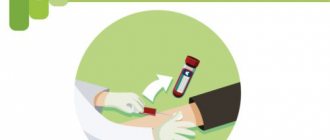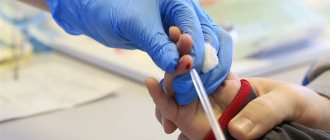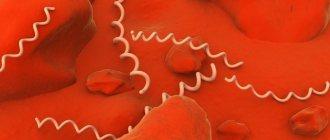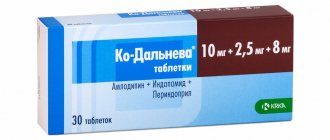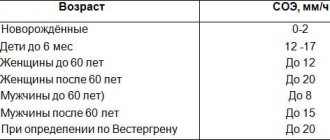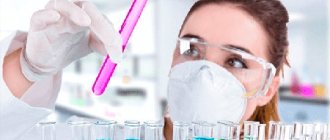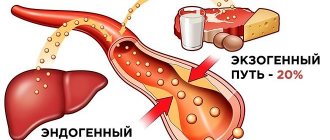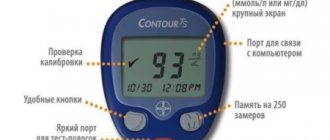Home — Rules for preparing a patient for laboratory and ultrasound examinations — Preparation for blood tests
Food restrictions | Capillary blood | General clinical analysis | Biochemistry | Coagulogram | Hormones | Infections | Glucose tolerance test | TSH | Vitamin D
Blood counts can change significantly throughout the day, so it is recommended to take tests in the morning. For this period, reference intervals for many laboratory parameters have been calculated. This is especially important for hormonal studies.
- All blood tests are done before radiography, ultrasound and physiotherapeutic procedures.
- Do not smoke 2 hours before donating blood.
- For 2-3 days, do not overeat, especially fatty foods, avoid alcohol, intense physical activity, and also do not visit the bathhouse or sauna.
Food restrictions:
- On an empty stomach: at least 4 hours after the last (not large!) meal.
- Strictly on an empty stomach: at least 8 hours after the last meal. In newborns and children in the first months of life, blood sampling is allowed no earlier than 2 hours after eating.
- Fasting: no food intake for at least 12-14 hours.
- Drinking regime . Drinking water does not affect blood counts, so drinking water is allowed (not mineral, non-carbonated). Juice, tea, coffee are prohibited.
Blood test for infections
Blood is donated in the morning on an empty stomach (or in the afternoon and evening, 4-5 hours after the last meal). 1-2 days before the test, exclude high-fat foods from your diet. Before donating blood for viral hepatitis, 2 days before the test, it is advisable to exclude citrus fruits, orange fruits and vegetables from the diet.
The results of tests for the presence of infections depend on the period of infection and the state of the immune system, so a negative result does not completely rule out infection. At an early stage of the disease, seroconversion occurs (absence of antibodies during the acute period of the disease). In doubtful cases, it is advisable to re-test after 3-5 days. A blood test for the presence of IgM class antibodies to infectious agents should be carried out no earlier than 5-7 days from the moment of illness, and IgG and IgA class antibodies no earlier than 10-14 days. This is due to the timing of the production of antibodies by the immune system and their appearance in the blood in the diagnostic titer.
Seal
Hormones
Blood collection is carried out strictly on an empty stomach: at least 8 hours must pass from the last meal (preferably at least 12 hours). You are allowed to drink water (non-mineral, non-carbonated). It is forbidden to drink juice, tea, coffee. 2-3 days before the test, do not overeat, especially fatty foods. Avoid alcohol, intense physical activity, and do not visit the sauna or bathhouse.
- On the day of blood collection, avoid taking medications; if withdrawal is not possible, inform the laboratory.
- When studying hormones over time, it is advisable to take blood samples at the same time of day.
- Some hormones need to be taken by women on certain days of the menstrual cycle. This information can be obtained from your doctor.
Attention!Q Blood collection for cortisol is carried out strictly on an empty stomach, strictly in the interval from 8:00 to 11:00 (the exact time of venipuncture is indicated).
Taking blood from children under 14 years of age
Psychological preparation of the child
- The main requirement for mom is to remain completely calm. Children, especially toddlers, feel their mother’s mood very keenly and also begin to get nervous if she is afraid of the upcoming procedure. With a child who has already reached preschool or school age, discuss what will happen. You should not scare him, especially if he is donating blood for the first time. You can also warn that the child is likely to experience discomfort.
- Make sure your child is not bored before the blood is drawn. Take with you a book, his favorite toy, a coloring book with markers - depending on the age of the child. This will not only take up his time, but will also not allow him to concentrate on the fear of the upcoming procedure.
- Decide whether you need to be present in the doctor's office during the test. Of course, it will be needed if the child is very small, but for some schoolchildren, even in the lower grades, the presence of parents can only interfere and provoke crying or protest. Focus on the child's psychological characteristics.
- During the blood collection procedure, small children should be held in your arms. If a child feels the warmth and protection of his mother, he reflexively calms down even in an unfamiliar and frightening environment.
- It is advisable to begin drawing blood not immediately after entering the treatment room. You need to give the baby a couple of minutes to get acquainted with the situation and the stranger who will take his hands.
Preparation before donating blood
- Remember that the best time to take a blood test is in the morning; the standards for all tests were developed specifically for the time interval from 8 to 11 am.
- Donating blood for testing should be strictly on an empty stomach. At least 8 hours must pass between the last meal and the blood draw. It is quite difficult to adhere to this rule with children, but it is quite possible. Drinking juices, tea, or eating cookies in the morning is prohibited, as this can significantly distort the results. You can only drink water. Take something tasty with you so that you can eat immediately after leaving the treatment room.
- The child's diet 1-2 days before the blood test should exclude fatty and fried foods and sweets.
- For better blood filling of the vessels, it is advisable to give the child 100-200 ml of water to drink 30 minutes before blood sampling (for children from 1 year).
- After the analysis, think about how you can please your child for good behavior. A small surprise gift will help smooth out the unpleasant impressions of the hospital.
Glucose tolerance test
Attention: A glucose tolerance test is prescribed only after consulting a doctor. This study is not performed for patients with type 1 diabetes mellitus.
Blood collection is carried out in the morning, after fasting: at least 12-14 hours must pass from the last meal.
- Before performing the glucose tolerance test, follow a diet for 3 days (no more than 150 grams of carbohydrates per day), exclude intense physical activity, and do not visit the bathhouse or sauna.
- 3 days before the test, stop thiazide diuretics, contraceptives and glucocorticoids (in consultation with your doctor).
- Do not drink water or smoke during the study. Repeated blood sampling is carried out 1 hour and 2 hours after the “load” of glucose.
Dos and don’ts before biochemical tests: general biochemistry, cholesterol, glucose
Drink: Drink as usual, but make sure it's water and not soda or alcohol. It is advisable to eliminate coffee and tea one day before.
There are: before a biochemical blood test there are most restrictions on food. The day before donating blood, it is necessary to exclude from the menu fatty foods (it will affect cholesterol levels), sweets in large quantities, even grapes (the biochemical complex includes glucose measurement), purine-rich foods such as meat, liver, legumes (so as not to mislead the doctor). misconception of high uric acid levels). It is necessary to take the test on an empty stomach; you can have your last meal 8 hours before the procedure.
Loads: Peak loads are still not recommended.
Medications: All unnecessary medications must be eliminated the week before blood donation. But if you have medications prescribed by your doctor that cannot be canceled, do not be upset, indicate the names and dosages on the prescription itself.
Even if you were inattentive and had a heavy breakfast on the day of the test, don’t be upset. Instead of going to donate blood and pay for results that may be incorrect, re-register the next morning with Lab4U. Just 3 clicks and any of our medical centers will be waiting for you at a convenient time. And a 50% discount on all biochemical studies will relieve you of stress!
Preparing for a thyroid-stimulating hormone (TSH) test
TSH levels are the most sensitive test for assessing thyroid function. However, it remains the most frequently deviating from the reference interval among all hormonal studies. To obtain reliable results, in addition to the general rules for preparing for laboratory tests, it is important to follow the rules below:
- The TSH level changes significantly during the day: its highest concentration is determined in the morning, and its minimum in the evening. You should donate blood at the same time, especially in case of repeated tests, since the time of blood donation plays an important role in the interpretation of the TSH level.
- In the case of thyroid hormone replacement therapy, it is necessary to take the drug after drawing blood for testing. Taking thyroxine and iodine the day before the test does not affect the TSH concentration. It is advisable to carry out repeated studies of TSH levels in order to monitor therapy no earlier than 6 weeks after changing the dose or type of drug.
- It must be remembered that the TSH result may be distorted by the effects of medications taken or the products of their metabolism. Before donating blood for analysis, you should consult your doctor about the possibility of limiting the intake of medications during the period of preparation for the study. It is recommended that you stop taking medications, including dietary supplements, before the study. If it is impossible to stop taking medications, you should provide the name of the drug and the time of its last use when donating blood.
- The thyroid gland is associated with the work of many organ systems, disorders in which can affect the secretion of the hormone: acute and chronic stress, acute infectious diseases, disorders of lipid and vitamin metabolism, leading to excess cholesterol, homocysteine, as well as disturbances in sleep patterns and wakefulness at night, which disrupt the normal rhythm of TSH secretion. The influence of these conditions must be taken into account when interpreting the results if it is not possible to postpone the study to a later date.
- Different research methods may be used in different laboratories, therefore, in order to correctly evaluate the research results, it is necessary to conduct research in the same laboratory and on the same analytical system.
Taking blood from children from 1 day to 12 months
- Try to schedule blood sampling for infants during the break between feedings, closer to the second feeding.
- 30 minutes before the procedure, the child should drink 50 ml of the liquid that you usually give him.
- When taking blood, the child’s hands must be warm. If you come from outside or the room is not so warm, the child’s hands need to be warmed. This is a mandatory and very important condition, because the amount of blood that will be received by the health worker depends on its fulfillment.
- Immediately before blood is drawn, the child should be positioned so that he is as comfortable as possible. A couple of minutes should pass before the nurse begins drawing blood. This time will be enough for the baby to calm down and get used to the environment a little.
Can drinking water affect research results?
If a general blood test is performed, the amount of liquid taken, if it is clean drinking water without dyes and sweeteners, does not matter. In this regard, even a large amount of it will not affect the results. However, in a number of other cases the situation is different - for example, during a biochemical study, as well as tests to establish cholesterol and hormone levels, it is forbidden to drink more than a couple of sips. Otherwise, the blood may become more liquid, which in turn will affect the performance.
This is due to the fact that water consists of chemical elements, therefore, under certain conditions it creates an error, including when studying hormonal parameters. The doctor must decide to prohibit the intake of a certain amount of water, based on the type of examination being planned and its direction.
Blood sugar levels
lThe normal blood sugar level for an adult is:
- 3.3–5.5 mmol/l (when collecting capillary blood)
- 3.7–6.1 mmol/l (at sampling)
If the level is exceeded above 6.1 mmol/l, it is necessary to be examined.
In order for your results to be reliable, you need proper preparation for the sugar test.
Rules for conducting the Rehberg test
To carry out the study prescribed for you, you must: after waking up (for example, 8:00) completely empty your bladder and pour out the urine. Then drink two to three glasses of water over a period of time (10–15 minutes). In about 1 (9:00) be in the treatment room to draw blood from a vein to determine creatinine. Another hour after this (10:00), empty the bladder again, collect all this urine in a container and submit it for analysis, where the volume of urine received in two hours is measured and creatinine is determined in it. You only need to indicate on the referral form the exact period of time for urine collection (for example: 2 hours or 1 hour 55 minutes)
Memo to patients
It should be remembered that one of the important components of the recovery process is a correctly established diagnosis. But it cannot always be determined if the preparation for the prescribed tests was done incorrectly or was not of sufficient quality. Therefore, you should not neglect the recommendations given by your doctor or nurse so that you do not have to undergo the test again.
If something is unclear, it is better to ask again - now there are many clinics not only in Moscow, but also in other cities of the Russian Federation, where specialists will tell you the answer to any question regarding all types of laboratory tests. The main thing is not to forget that taking care of your health is a personal matter; entrusting it to someone else is not always advisable.
Indications for analysis
Symptoms that may be caused by low blood sugar:
- constant lethargy, fatigue;
- increased sweating;
- anxiety;
- attacks of hunger.
Symptoms that high sugar levels can cause:
- rapid breathing;
- dry mouth, thirst;
- dry skin;
- decreased clarity of vision;
- frequent urge to urinate;
- poor wound healing;
- itching of the skin and mucous membranes;
- weight loss.
If you notice some of the listed symptoms, make an appointment with a general practitioner, he will conduct a diagnosis and write a referral for the necessary analysis.
With both deviations from the norm, an unstable mental state and mood swings may be observed.
